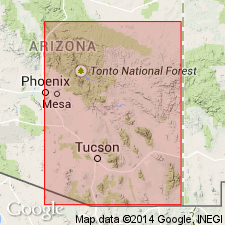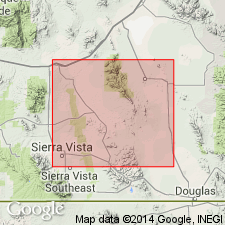
- Usage in publication:
-
- Pima sandstone
- Modifications:
-
- Named
- Dominant lithology:
-
- Sandstone
- AAPG geologic province:
-
- Basin-and-Range province
- Pedregosa basin
Summary:
Named presumably for Pima Co., AZ. No type locality designated. A "buff, hard sandstone with inclusions of the Bolsa quartzite in places." This sandstone, only 4 ft thick, "has been traced more than 60 mi from the Whetstone Mountains" in Cochise Co., in the Pedregosa basin to the Picacho de Calera Hills, Pima Co., in the Basin-and-Range province. [He no doubt meant "correlated" rather than "traced".] Overlies Bolsa quartzite. Overlain by Cochise formation. Is of Middle Cambrian age.
Source: GNU records (USGS DDS-6; Denver GNULEX).

- Usage in publication:
-
- Pima sandstone
- Modifications:
-
- Not used
- AAPG geologic province:
-
- Pedregosa basin
Summary:
Pima sandstone of Stoyanow (1936). Not used in Whetstone Mountains, Cochise County, southeastern Arizona. Rocks included in zone at base of Abrigo limestone, along with rocks of Cochise formation (not used). Gradational contact with underlying Bolsa. Report includes geologic map.
Source: Modified from GNU records (USGS DDS-6; Denver GNULEX).
For more information, please contact Nancy Stamm, Geologic Names Committee Secretary.
Asterisk (*) indicates published by U.S. Geological Survey authors.
"No current usage" (†) implies that a name has been abandoned or has fallen into disuse. Former usage and, if known, replacement name given in parentheses ( ).
Slash (/) indicates name conflicts with nomenclatural guidelines (CSN, 1933; ACSN, 1961, 1970; NACSN, 1983, 2005, 2021). May be explained within brackets ([ ]).

